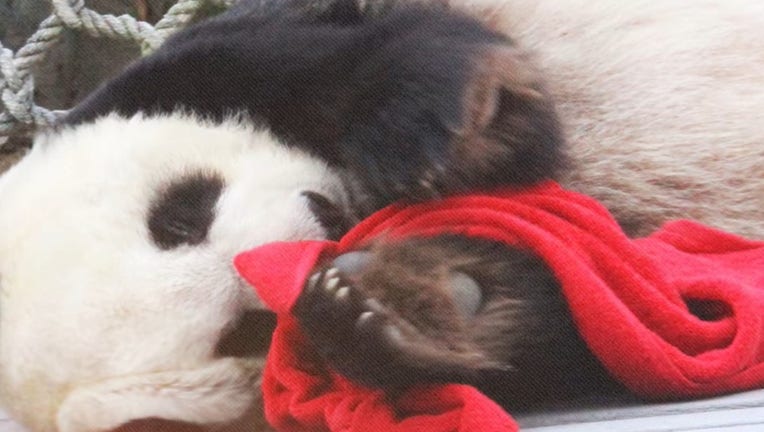Memphis Zoo says giant panda Le Le has died

Le Le. (Credit: Memphis Zoo)
MEMPHIS, Tenn. (AP) - Giant panda Le Le has died, the Memphis Zoo announced Friday.
The panda, born July 18, 1998, died Wednesday, zoo spokesperson Rebecca Winchester said in an email. His cause of death has yet to be determined as a medical investigation is pending, the zoo said.
"Le Le’s name translates to ‘happy happy,’ and his name perfectly reflected his personality," the zoo said in a statement. "Le Le was a happy bear that enjoyed apples, engaging with enrichment and relaxing while covering himself with freshly shredded bamboo. He had an easy-going personality and was a favorite of all who met and worked with him over the years."
Le Le’s peaceful death as he slept was "sudden and unexpected" with no indication that he was sick, zoo President and CEO Matt Thompson said at a news conference Friday. Nothing in video footage from the days leading up to Le Le’s death indicated that there was anything wrong with him, he said.
Le Le had been at the zoo since 2003 and was expected to return to China soon with female panda Ya Ya as a loan agreement ended with the Chinese Association of Zoological Gardens.
Advocacy groups In Defense of Animals and Panda Voices raised concerns about the pandas’ conditions in the past and applauded the animals’ planned return to China. In recent days, Panda Voices members watching the panda cam saw Le Le collapse and when they tried to get information about his condition, they were told there were no known health issues, according to Tom Clemenson, the group’s U.S. spokesman.
"We are absolutely devastated," Clemenson said. "Our fight continues. We will investigate as best we can."
When asked about these allegations, Thompson, who referred to Le Le and Ya Ya as "two of the most spoiled animals on the planet," said the groups had made false accusations over the years. Days before the panda’s death, there were a couple of hours when he was not eating well, perhaps due to a stomach upset, but it didn’t continue and he was "completely normal" a short time after, Senior Veterinarian Felicia Knightly said. Experts from the U.S. and China will complete a post-mortem examination, she said.
The life expectancy of a giant panda in the wild is about 15 years, but in captivity they have lived to be as old as 38. Decades of conservation efforts in the wild and study in captivity saved the giant panda from extinction, increasing its population from fewer than 1,000 at one time to more than 1,800 in the wild and captivity.

